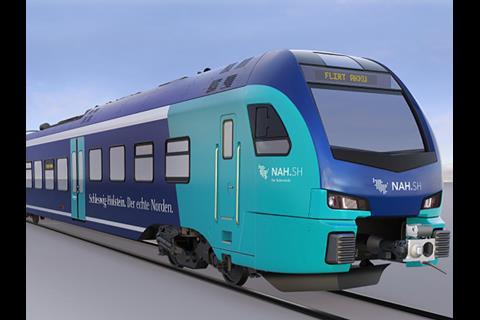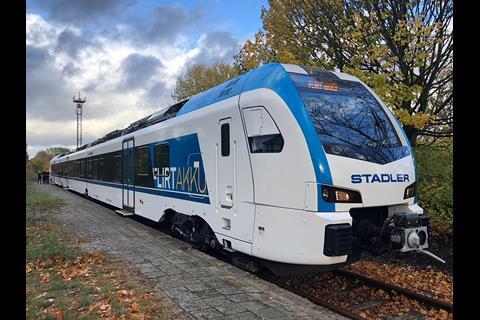GERMANY: Schleswig-Holstein transport authority NAH.SH has formally awarded preferred bidder Stadler a contract to supply a fleet of battery-powered Flirt Akku multiple-units for use on regional services from 2022.
The €600m deal includes a firm order for the supply of 55 trains and the provision of 30 years of maintenance. There are options for the supply of a further 50 units.
The Land had called tenders for the supply of zero-emission vehicles for use on non-electrified routes, leaving the choice of technology to the bidders. Stadler opted to offer the Akku battery-powered version of its Flirt family which was announced at InnoTrans 2018, with a prototype demonstrated shortly afterwards.
‘We are pleased that the first call for tenders for vehicles with alternative drives has been decided in our favour’, said Jure Mikolčić, CEO of Stadler in Germany, when the NAH.SH order was confirmed on July 2. ‘Since 2016, we have been in close and constructive exchange with the operator and with Schleswig-Holstein to find the best possible solution for CO2 emission-free operation. It makes us very proud that with the battery-powered Flirt we have not only managed to find an ecological and innovative solution, but have also enabled a clear economic improvement. If we consider the average life of a rail vehicle of around 30 years, battery-operated vehicles are more cost-effective than diesel’.
The Flirt Akku trainsets are scheduled to begin replacing DMUs from the end of 2022. Stadler said they would be significantly quieter and more energy efficient, while offering better acceleration.
They will have range of 150 km under optimal conditions, although the longest non-electrified route they will operate on is around 80 km. The batteries will be recharged from the existing 15 kV 16·7 Hz overhead electrification at Kiel, Neumünster, Flensburg, Lübeck and Lüneburg stations and on the Osterrönfeld – Jübek line. Charging facilities will also be provided in other locations, and there will be some extensions to the existing overhead power supply.
‘Electrification without overhead contact line is an exciting project, which will also be noted with interest in other regions’, said NAH.SH Managing Director Bernhard Wewers.
The two-car units will have 124 seats and total capacity of 198 passengers. There will be two multi-purpose areas for wheelchairs, pushchairs and bicycles, as well as an accessible toilet. Other features will include air-conditioning, wi-fi, power sockets, CCTV and a passenger information system.
Maintenance will be undertaken in Rendsburg and Neumünster.
- A feature article about the development of battery-electric multiple-units around the world appeared in the November 2018 issue of Railway Gazette International magazine.



















